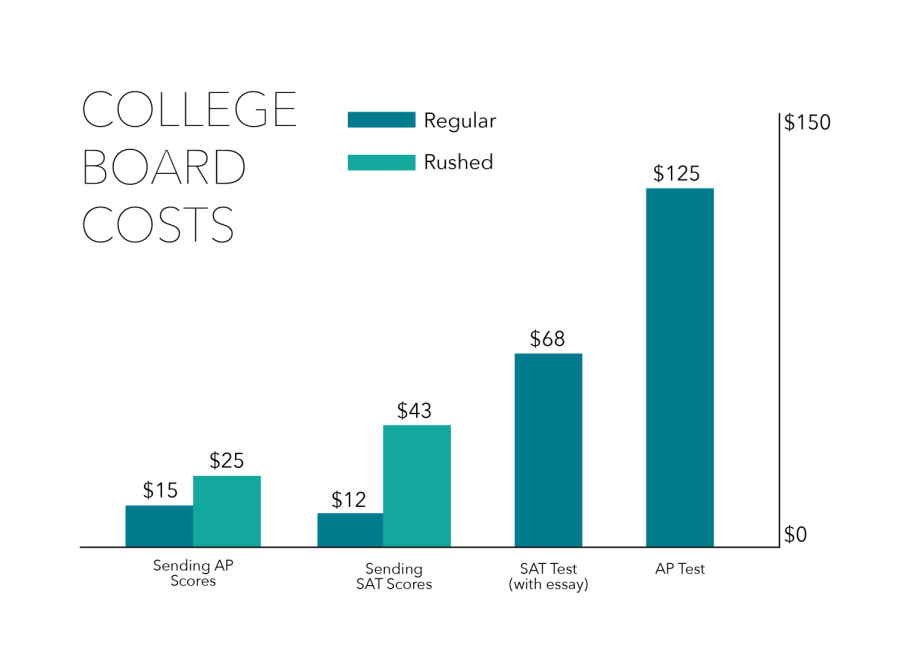After many months of writing essays, asking for letters of recommendation and awaiting deadlines, like most other high school seniors, I have finally finished applying to college. But while this educational milestone is certainly worth celebrating, looking back on my experience, I realize that I have been effectively and thoroughly scammed.
That’s right. Scammed. Or however you might define the College Board’s manipulation of anxious high school seniors to earn a sizable profit.
Allow me to explain: most schools that are not “test-blind” allow students to self-report their SAT scores in their initial application, and then require an official score report sent through the College Board if students are eventually admitted. A select few schools, however, require an official score report along with the initial application, but they do not advertise this policy on their admissions website or on the Common App.
Why is this an issue? Shortly after submitting an application to a college, I received an email telling me that they required my SAT scores to come directly from the official testing agency, and that I had four days to send an official report or my scores would not be considered.
A standard College Board score report, which for some reason takes about two to six weeks to send, costs $12, an already egregious amount to pay for simply emailing a PDF document.
But I did not have two to six weeks, I had four days. So I was forced to purchase a rush order, which costs an additional $31, bringing my total to $43. Like I said, I was scammed.
My theory is that the College Board is colluding with the college I applied to, as well as other schools that require official test score reports. If these colleges do not clearly mention that they need a score report with the initial application, then more and more students are faced with my conundrum— and the College Board receives countless $43 payments.
The college I applied to also happens to be experiencing a financial crisis, and has been forced to make budget cuts and renegotiate various faculty contracts. I speculate that the College Board is paying said college to lessen their economic dilemmas in return for requiring official score reports with the initial application.
I wish this circumstance was the only instance of the College Board’s deceit during the college application process, but unfortunately it is not.
To take these SAT or ACT tests that I paid to send to a college, students must pay $52 to the College Board with an additional $16 to complete the essay portion.
Many students like me also take a variety of AP classes in their junior and senior years, which offer optional AP Exams at the end of the year. The College Board administers these tests, and with no late fees, students have to pay $125 for each exam.
A high AP score can potentially waive a college course, which costs significantly more than $125. However, most students do not know which college they will attend when they sign up for AP tests, and some schools either only accept certain scores or do not accept them all together.
And of course, just like sending SAT scores to colleges costs money, students must also pay an additional fee to submit their AP scores.
The College Board advertises that sending AP scores is completely free … except they are only free until June 20, and after this date standard scores cost $15, the rushed scores $25. The College Board typically releases AP scores in mid-July, which forces students who want to send their senior-year scores to pay extra.
Let’s say a hypothetical student applies to two colleges who covertly require official SAT score reports, takes the SAT twice (with the essay, of course), takes three AP tests in both their junior and senior years and needs to pay the rushed fee to send their AP scores. This student would pay the College Board a grand total of $997.
Attending a university after high school is already a costly investment for seniors, with application fees, transcript-sending expenses and of course, college tuition. Spending close to $1000 on unnecessary College Board payments is nonsensical and unfair, especially for those who are at a financial disadvantage.
While there are various fee waivers available throughout the college application process, many students who do not qualify for one might decide to apply to fewer colleges or not take standardized tests simply because they cannot afford the College Board’s inequitable prices.
I am excited to attend college next year. But like most other high school seniors, I will have spent too much money getting there.









